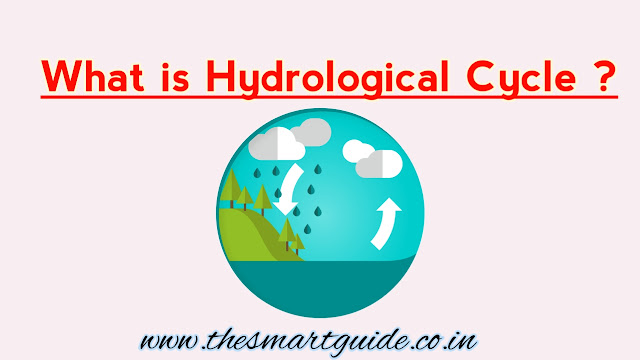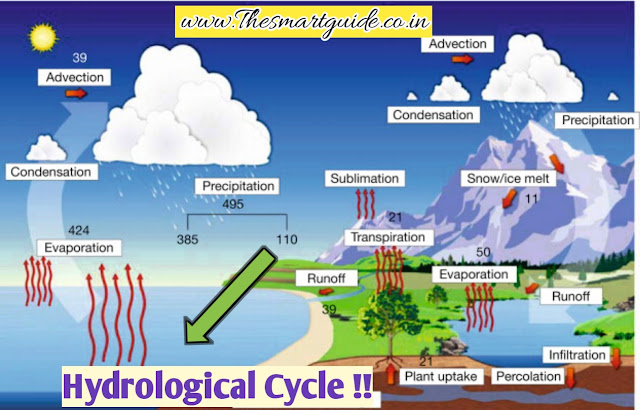Hydrology is the Most important concept in civil Engineering and the Scope of the Hydrological cycle is increasing as days pass, Beginning in Hydrological Cycle Definition we refer basic Scope and applications of Hydrology in terms to understand the concept.
What is the Hydrological Cycle definition?
Water Exchanges from the surface to the atmosphere by the Influence of Solar radiation is Hydrological Cycle Definition.
Water transforms from one place to another under the action of sun heat. In this process entire water system remains constant.
Uses: To move things like pathogens, nutrients, etc., in the aquatic ecosystem.
Hydrology:
It is the study of water at any temperature on the earth's surface like rain, wind, snow, etc., from origin to all its destination from the earth.
Scope of Hydrology:
- Water is used for power generations, navigation, fisheries, etc.,
- It is the most valuable natural resource essential for every species in the world.
Read Previous Article: Simple Harmonic Motion, 22 ways to earn money
What are the Principle sources of energy for the Hydrological cycle?
Sun is the Principle source of energy for the hydrological cycle.
The Hydrological Cycle Definition or Hydrological cycle involves the total earth system and hence it is divided into three important parts or zone,
- Hydrosphere
- Lithosphere and
- Atmosphere
What are Hydrologic cycle reservoirs?
Atmosphere, land, and oceans are the hydrological cycle reservoirs in the hydrological cycle.
Basic Components in Hydrological Cycle Definition?
There are mainly 9 types of Components in the Hydrological Cycle, they are
- Evaporation
- precipitation
- Interception
- Runoff
- Condensation
- Infiltration
- Depression Storage
- Transpiration
- Evapotranspiration
Detailed Guide on Components of the Hydrological Cycle Definition
- Evaporation: The process of Conversion of Natural Liquids to gaseous Forms like Air. It happens in the water bodies.
- Precipitation: Fall of moisture from the atmosphere to the earth's surface in any form is known as Precipitation.
Ex: Hail, Rain, etc.,
- Interception: The quantity of precipitation required to wet the soil and buildings and all pervy surfaces is called Interception.
- Runoff: Flowing water making its way towards the rivers, oceans, Lakes, etc., as subsurface flow and surface flow.
Runoff classified into 2 types
* Surface and Subsurface Flows.
- Condensation: Conversation of Vapor or Gas to the Liquid known as condensation.
- Infiltration: Filtering of water in the inner layer of the soil based on its structure and nature.
Infiltration of the coarse Material is more compared to fine materials in the soil particles like clay and sand.
Infiltration is inversely proportional to the runoff.
- Depression Storage: The Amount of precipitation required to fill depression zones (Mainly in the land)
- Transpiration: It is the Process in which Evaporation takes place from any plant or tree.
- Evapotranspiration: It is the Combination of Transpiration and Evaporation known as Evapotranspiration.
Groundwater Hydrologic cycle?
People Also Search For(FAQ'S)
1)Name the principal source of energy for the Hydrological cycle?
Ans. Sun is the Principal source of energy in the hydrological cycle.
2)What are the Hydrological cycle reservoirs?
Ans. Oceans, Lands, and the atmosphere are the hydrological cycle reservoirs.
3)What is another term for the hydrological cycle?
Ans. The hydrological cycle is also termed the water cycle.
4)Name Some of the reservoirs in the Hydrological cycle include?
Ans. As we discussed we have 3 reservoirs Atmosphere, ocean, lands, etc.,
5)What is the primary energy source that drives the hydrologic cycle?
Ans. Sun is the primary energy source that derives energy.
6)How does urbanization affect the Hydrologic Cycle?
Ans. It influences Evapotranspiration and Infiltration in Society.
Hope you guys Understood Hydrological Cycle Definition, Suggest topics in the Comments Below and share with your friends for Further Updates Stay tuned to this Site.



Really helpful Article. Your content is very good and attractive I learn many things from your content. keep sharing this type of helpful content. Thanks Blog Topics Profitable Blog Niches 2022
ReplyDeletePost a Comment